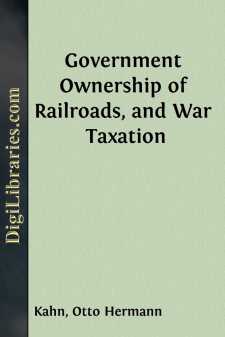Categories
- Antiques & Collectibles 13
- Architecture 36
- Art 48
- Bibles 22
- Biography & Autobiography 813
- Body, Mind & Spirit 141
- Business & Economics 28
- Children's Books 12
- Children's Fiction 9
- Computers 4
- Cooking 94
- Crafts & Hobbies 4
- Drama 346
- Education 46
- Family & Relationships 57
- Fiction 11826
- Games 19
- Gardening 17
- Health & Fitness 34
- History 1377
- House & Home 1
- Humor 147
- Juvenile Fiction 1873
- Juvenile Nonfiction 202
- Language Arts & Disciplines 88
- Law 16
- Literary Collections 686
- Literary Criticism 179
- Mathematics 13
- Medical 41
- Music 40
- Nature 179
- Non-Classifiable 1768
- Performing Arts 7
- Periodicals 1453
- Philosophy 64
- Photography 2
- Poetry 896
- Political Science 203
- Psychology 42
- Reference 154
- Religion 513
- Science 126
- Self-Help 83
- Social Science 81
- Sports & Recreation 34
- Study Aids 3
- Technology & Engineering 59
- Transportation 23
- Travel 463
- True Crime 29
War Taxation Some Comments and Letters
Categories:
Description:
Excerpt
This is a reprint, somewhat amplified, of an article printed recently in the New York Times. The original article was written before the recommendations of the Ways and Means Committee of the House of Representatives were reported.
In a time of patriotic exaltation and of universal obligation and readiness to make great sacrifices to bring a most just and righteous war to a successful conclusion, the voice of sober argument and matter of fact considerations is apt to grate upon the ears of the people.
That voice is all the less likely to be popular when the arguments it puts forth may easily lend themselves to the interpretation of being actuated by solicitous care for selfish interests.
I am fully aware that by publishing the following observations I am exposing myself to that interpretation and to criticism of, and attack upon, my motives.
Yet, seeing that certain measures now under consideration threaten to take shape in a way which, from my practical business experience and after mature deliberation, I am bound to regard as faulty and as indeed harmful to the country, I believe it to be right and proper to contribute my views to the public discussion of the subject, for whatever they may be worth.
I can only hope, then, that in what I am going to say I shall be given credit for endeavoring to speak conscientiously and to the best of my knowledge and judgment from the point of view of the welfare of the entire country and not of the welfare merely of the well-to-do.
I shall address myself to the practical aspect and to a few phases only of the question and shall not attempt to enter into the economic theories and the broader and deeper considerations involved.
I shall assume in my argument that what Congress is seeking to accomplish is to impose taxes justly, effectively and scientifically with the desire to disturb the country's trade and commerce as little as possible and to avoid as much as may be the evils of financial dislocation.
I shall take it for granted that at a time when more than ever the unity of the country should be emphasized, sectional selfishness will find no place in the taxation program, and that, should it be attempted nevertheless, the congressional delegations of the States which would be unjustly affected, would resist, regardless of party affiliations, harmful discrimination against their constituents and their States.
I shall assume that it is not the purpose and intent of Congress, under the guise of the necessities of the war situation, to embrace the doctrines of Socialism.
Our present economic system, our present method of wealth distribution may or may not stand in need of change; the fact remains that Congress has no mandate to effect a fundamental change.
The consequence of such a change would be so immensely far-reaching that no government has the right to sanction steps to bring it about until the subject has been fully discussed before the people in all its bearings and the people have pronounced judgment through a Presidential or other election.
I will first state what in my opinion ought not to be done:
I
I take it that not many words need be used to expose the fallacy of the argument, heard even in the Halls of Congress: "If men are to be conscripted, wealth also must be conscripted."
Men will be conscripted to the extent that it is wise and just and needful....






